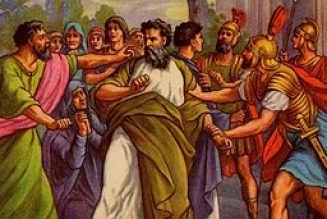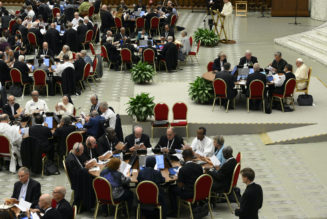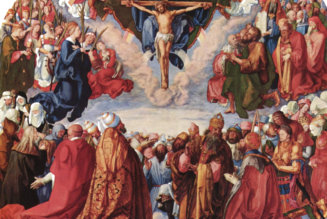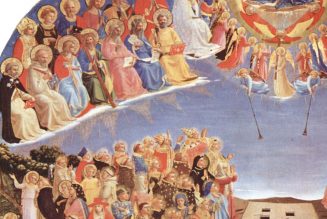, July 30, 2020

This Sunday, the 18th Sunday in Ordinary Time, we hear the “live-action version” of Jesus’s parables when he performs a miracle so significant that all four of the Gospel writers, including John, tell the tale.
When you consider what the story entails about how Jesus acts in our lives — and how we act in his — it’s no wonder the memory of this historic day was so cherished.
In one way the “multiplication” of the loaves is the wrong name for what Jesus does.
There is something very strange about the miracle of the loaves that is easy to miss.
It is clear that a tiny amount of food feeds an enormous number of people in the miracle — 5,000 families (“five thousand men, not counting women and children,” says Matthew). Church Fathers, the Catechism and eminent theologians throughout the years call what happens in the story “multiplication,” so that’s not wrong.
But as Erasmo Leiva-Merikakis points out in his masterful commentary on Matthew (Fire of Mercy, Heart of the Word), the Gospel itself never speaks of multiplication. Instead, “the text carefully stresses the passing of the loaves from hand to hand.”
“In whose hands were the loaves in fact ‘multiplied?’” Leiva asks. “Apparently the bread grew in the distribution of it, as a result of both Jesus’s blessing and of the disciples’ collaboration with him.”
St. Thomas Aquinas quotes St. Hilary of Poitiers saying essentially the same thing. “The five loaves are not multiplied into more, but fragments take the place of fragments, the substance growing whether upon the tables or in the hands that took them up, I know not.”
St. Rabanus Maurus says Jesus “creates no new viands [food items], but having taken what the disciples had, he gave thanks.”
Frank Sheed gives his own theory of what is happening here. In his book To Know Christ Jesus, he argues that what happens in the miracle should be the “multi-location” of the loaves and fishes, and quotes this odd sentence in John’s account of the miracle for confirmation: “They filled 12 baskets with the fragments from the five barley loaves” (John 6:13).
Leiva explains why the Gospel takes this approach. “The word ‘multiplication,’ smacking of magic, does not best convey the mysterious nature” of the event, which, in its reality “powerfully illustrates the theological principle that, where the Fire of Mercy is involved, the more that is given, the more there is.”
This is a demonstration of how grace works, completing a lesson which Jesus started with the parables.
What the parables describe by analogy, the Feeding of the Multitudes shows in action.
Human beings can’t make wheat or mustard trees we can only plant seeds and wait. Even now, when we know the scientific principles involved, it is mysterious to us how a hard-shelled seed goes from pebble to sprout to plant to food. In the same way, we knead yeast into dough and the rest is out of our hands. God created the world such that what little we have grows large.
It is the same in our daily lives. On our own, we can’t make anything swell and grow fruitful. Our petty efforts fail. Our best efforts fall short. Our selfishness leaves its mark on everything we try. Grace is the unseen helper that makes our efforts grow.
This is what the alcoholic finds in AA, when she turns to a higher power; what a married couple finds when marriage seems impossible, and they turn to God in desperation; and it is what each of us finds when we say, “Enough. I can’t handle this. I need help, Lord.”
It is also what happens in a smaller way in the tiny difficulties and triumphs of each day. “Grace is a participation in the life of God,” says the Catechism. We act with Christ and he acts with us, and every good thing is multiplied.
This grace is a free gift of God, but look how ready for it the Apostles and crowd had to be.
Consider the virtues the characters in this story have but that we often lack.
- The crowds were not hungry and grumbling for food. They were so focused on Jesus that even though they were in a deserted place without food at dusk, someone else brought up the subject of supper.
- The apostles were living a spartan, ascetic life. They had five loaves and five fish — not enough for 12 grown men and the many disciples accompanying Jesus.
- Also, Jesus waited to be asked before feeding the multitude. He doesn’t force himself or his gifts on anyone but always respects our freedom.
To use Jesus’s metaphors, the Apostles had eliminated the weeds from their lives and the crowds were rich soil where grace had room to grow. Openness to Christ, detachment and freedom are prerequisites for grace to this day.
After all, the miracles in the Gospels aren’t just history lessons, but introductions to how God lives with us now.
The Gospel miracles don’t just describe what Jesus did; they describe what he does. This multiplication (or “multi-location”) of the loaves, along with the miracle of Jesus walking on water, which we will hear next week, tell us that Jesus is not bound by the laws of space and time. Those two facts mean we can all eat the same Eucharist, repeated in tabernacles across the world like the fragments of loaves. Jesus can come to each of us, over oceans and through doors, wherever we are.
That is grace. Grace that fills our lives and produces fruit “a hundred, sixty or thirtyfold.”
But it takes faith. The faith of Isaiah in the generosity of a God who says, “You who have no money, come, receive grain and eat; / Come, without paying and without cost, drink wine and milk!”
It takes hope, the hope of St. Paul who says, “Neither death, nor life, nor angels, nor principalities, nor present things, nor future things, nor powers, nor height, nor depth, nor any other creature will be able to separate us from the love of God in Christ Jesus our Lord.”
And it takes love, a participation in the the great miracle of God’s generosity. Like the apostles feeding the crowds, we can return to him again and again, receive the gifts he gives us, and then by giving them away find them multiplied.
The math seems to work this way again and again: Our effort minus God equals nothing — but our effort plus God equals infinity.
Tags: 18th Sunday in Ordinary Time Year A, prayer, Sunday Gospel, Sunday Readings
Never miss a post! Subscribe below to our weekly newsletter.









